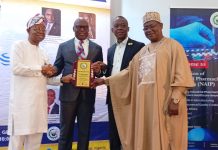By Ngozika Okoye, B.Pharm., MSc. (Clin. Pharm.), MPH, FPCPharm
Traditional medicine (TM) includes diverse health practices, approaches, knowledge and belief incorporating plants, animals, and/or mineral based medicines, spiritual therapies, manual techniques and exercises applied singularly or in combination to maintain well-being, as well as to treat, diagnose or prevent illness1.
The World Health Organisation (WHO) has supported, promoted and assisted the development of TM in a bid to move Africa health agenda forward, particularly for the less-developed countries of the world. This philosophy was reinforced at the Alma Ata Declaration of 1978 on Primary Health Care (PHC), which noted that majority of the developing countries of the world were unable to provide adequate healthcare delivery for their populations using conventional health facilities.
Since then, WHO, utilising several expert committees, policy decisions and resolutions, etc., has striven to provide guidelines that countries could adopt or adapt to develop their traditional (indigenous) systems of medicine, to improve their individual national health care delivery systems2.
October 22 was declared World Natural Medicine Day by the International Congress on Traditional Medicine, held in Beijing, China, from October 18 to 22, 1991. The declaration was aimed at creating public awareness for natural medicine (traditional/alternative medicine knowledge), in recognition of the valuable contributions of traditional/alternative medicine to healthcare delivery systems worldwide.
The WHO regional committee for Africa adopted a resolution in year 2000, on promoting the Role of TM in health systems: a strategy for the African Region. This resolution recognised the importance and potentials of TM for the achievement of Health for All (HFA) in the African region, and recommended accelerated development of local production of TM. The resolution further urged member states to translate the strategy into realistic national TM policies, backed up with appropriate legislation and plans for specific interventions at national and local levels, and to collaborate actively with all partners in its implementation and evaluation.
African leaders further demonstrated their commitment to the development and promotion of TM through the resolution in Abuja, Nigeria (2001), encouraging member nations to make research in TM a priority.
The WHO developed a three-year (2002-2005) TM strategy with focus on promotion of policy issues, safety, efficacy, quality, inclusion, access and rational use of TM. This was aimed at reducing excess mortality, morbidity and disability, especially in poor and marginalised populations noting that TM is a highly accessible and affordable form of healthcare delivery in many low income countries.
Considering the immense contributions of TM to the healthcare delivery system in Africa, the AU, in collaboration with WHO-AFRO decided in 2003 in Maputo, Mozambique, to declare 31st August every year for the commemoration of African Traditional Medicine (ATM). The themes of the ATM days since inception are directed towards highlighting and addressing various specific issues and challenges in the development and promotion of TM. Examples are:
Traditional medicine: Our culture, our future in 2003 (maiden ATM day).
Scaling up collaboration between traditional health practitioners and conventional health practitioners in the prevention of AIDS in 2006.
The Nigerian context
Since independence, the Federal Government of Nigeria (FGN) has initiated a number of activities aimed at developing and promoting TM, noting its indispensable role in improving healthcare delivery, job and wealth creation and national socio-economic growth and development. Such activities include:
FGN sponsoring a research programme on the medicinal properties of local herbs at the University of Ibadan in 1966.
Sending an official delegation on a fact-finding tour of India and China in 1977 to examine the systems of TM in these two countries with the aim of learning from their experience and developing indigenous TM.
The Federal Ministry of Health (FMoH) inaugurated a national committee on the training of Traditional Birth Attendants (TBAs) in 1978. The committee produced a national syllabus to be used by the various states in the federation to re-train and upgrade TBAs.
The Lagos State government set up a board of TM in 1980. The key mandate of the board was the accreditation attestation and registration of bona fide traditional healers. Similar boards were set up later in some other states of the federation.
The Nigeria Natural Medicine Development Agency (NNMDA) was established in 1997 by the Federal Ministry of Science and Technology (FMST) under the Science and Technology Act of 1980 and was charged with the responsibility to research and develop, collate and document, promote and preserve, provide education and training and services in Nigeria’s natural medicine defined as indigenous (traditional) health systems, medication and non-medication healing arts, science and technologies.
NAFDAC, in 2003, inaugurated an Advisory (think-tank) committee on the regulation and control of herbal medicinal products in Nigeria, with NNMDA, NIPRD and selected government agencies as members. NAFDAC has also developed several initiatives/guidelines for the registration and control of herbal medicinal products.
Nigeria’s Herbal Pharmacopeia was published in 20082.
Presidential Initiative Committee on Development, Promotion and Commercialisation of Nigerian Herbal Medicinal Products was inaugurated on 30th May, 2006.
The bill for Traditional Medicine Council of Nigeria was passed for third reading in 2017.
REFERENCES
WHO (2000): General Guidelines for Methodologies on Research and Evaluation of Traditional Medicine. WHO/EDM/TRM/2000.1. Available at: http://apps.who.int/iris/bitstream/10665/66783/1/WHO_EDM_TRM_2000.1.pdf.
Gurib-Fakim A. and Kasilo O.M.J.(2013): Promoting African Medicinal Plants through an African Herbal Pharmacopoeia. WHO Regional Office for Africa. Available at: https://www.aho.afro.who.int/en/ahm/issue/13/reports/promoting-african-medicinal-plants-through-african-herbal-pharmacopoeia. Accessed: 1st August, 2017.
Ngozika Okoye wrote from the Nigeria Natural Medicine Development Agency











Nice